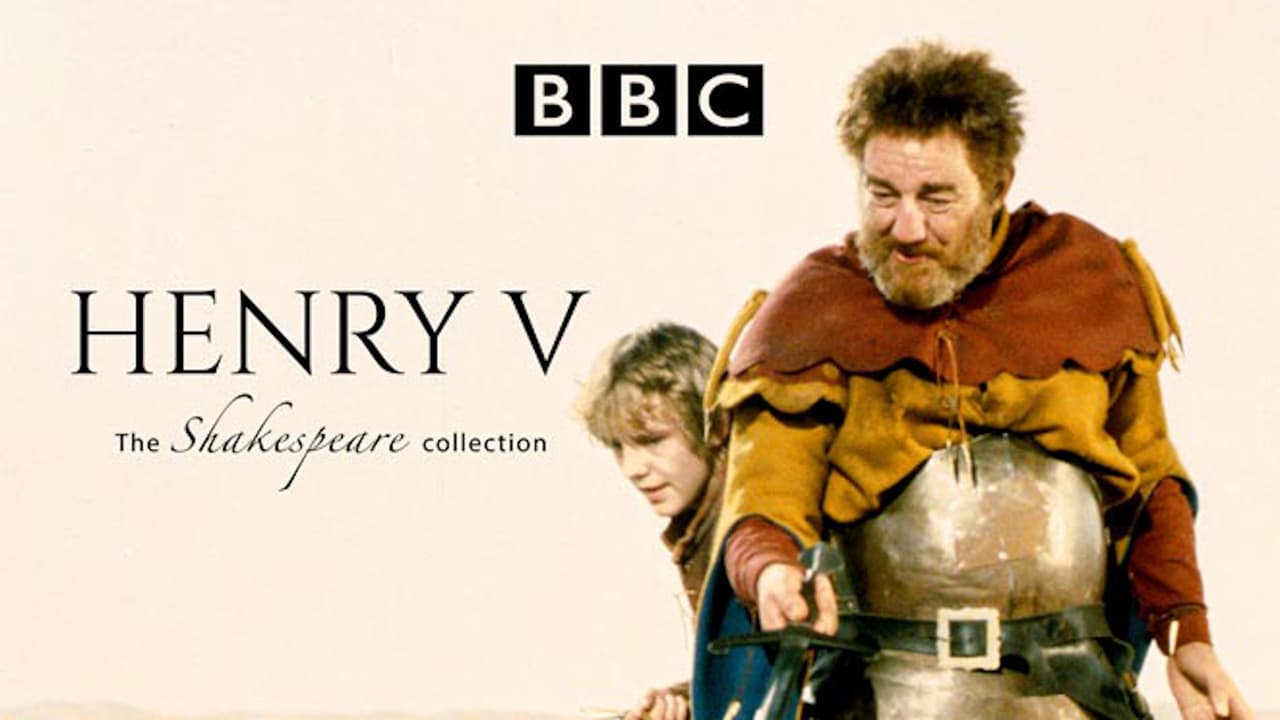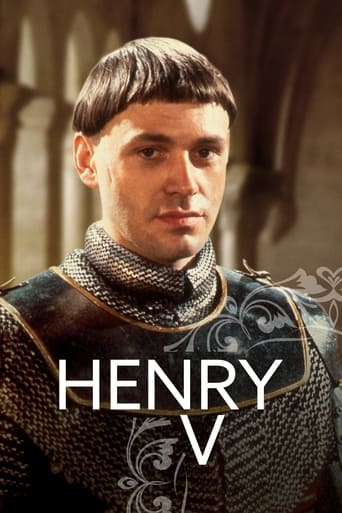Matrixston
Wow! Such a good movie.
Phonearl
Good start, but then it gets ruined
Spoonixel
Amateur movie with Big budget
Darin
One of the film's great tricks is that, for a time, you think it will go down a rabbit hole of unrealistic glorification.
bkoganbing
Although this BBC televised play would as a matter of course lack the production values that Laurence Olivier and Kenneth Branagh brought to their films of Henry V, this adaption is second to none in the quality of the performance. In fact David Gwillim who had played Prince Hal in both parts of Henry IV grew into the role in a way that Olivier and Branagh never did.It is interesting to speculate how history might have changed had Henry V gotten a few more years. While British historians proclaim one of the greatest of monarchs, the French see him as slightly below Hitler as one of the greatest enemies of their country. As well they should, the English got battlefield glory, the French buried battlefield dead as the 100 Years War was fought in their country. He died a couple of years older than that other conqueror Alexander the Great and had both of them lived who knows what they might have achieved.Henry V is fulfilling the promise of greatness that he showed so little of as Prince Hal. The play concerns itself with his taking full command of the throne, executing some conspirators who were planning to assassinate him, and then achieving one of the great battlefield triumphs of the Middle Ages, the English victory at Agincourt over a French army that outnumbered them. Gwillim plays Henry with authority and decisiveness that rank with what Olivier, Branagh and others have done with the part.The BBC series of Shakespeare plays were productions of the highest quality. I only wish that they were all available in this country as this one was. I saw it when it first aired on American public television back in 1979 and it is still as good as I remembered it from then.
poly-nikes
Reviewer "anne-25" from England was evidently so exercised by what she perceived as shortcomings in this excellent production of "Henry V" that she neglected to listen to the words. In the opening Chorus, we are advised that, since the entire combatants of Agincourt could not be incorporated into the production, we must "into a thousand pieces divide one man." A little further along, the Chorus enjoins us thusly: "O, pardon! since a crooked figure may attest in little place a million." Shakespeare obviously knew something that "anne-25" does not -- it's unfeasible to expect two medieval armies to be incorporated into a humble stage production; therefore, we must use our imaginations, as per, again from the Chorus, "upon your imaginary forces work." Even Olivier's and Branagh's film versions left a lot to be desired in this aspect. Olivier's Agincourt was confusing and brief (although the arrow flights, abetted by Walton's glorious music, were stunning); and Branagh's, although more realistic and bloody (fought in the rain as was the real Agincourt), made us suffer through excruciating and over-used slow motion, a device that never adds to action sequences. And by my count, there were far fewer than sixty thousand French soldiers in either production.So, "anne-25," a little advice -- listen to the Chorus next time, and perhaps you'll enjoy yourself much more.
tonstant viewer
Alec McCowen's Chorus triumphantly opens the play with a summons for a Muse of Fire, but unfortunately someone handed this Muse a fire extinguisher, and flashes of insight, or even energy, are few and far between. The usual small budget and brief shooting schedule forced videotaping in the studio, but the absence of grand vistas and real battles is not really a problem. Shakespeare's text has the Chorus apologizing for the inadequate scale of combat simulation in the confines of the Globe, and we are instructed to use our imaginations.This video is a distinct notch below the preceding two Henry IV plays, even though it shares the same director, David Giles. Playing off Anthony Quayle and Jon Finch, David Gwillim's Prince Hal was forced into some level of theatrical vitality. Here Gwillim's weepy, whispery Henry is the whole show, and he doesn't carry it comfortably on his shoulders. The supporting cast is notably weak, with such accomplished scene stealers as Thorley Walters, Julian Glover and Anna Quayle uncharacteristically ineffective. And both the Fluellen and Pistol are actively annoying.Individual scenes may work well, like the exposure and condemnation of the regicide plotters or the final scene with Henry and Katherine, but all too often the pulse stops completely, and we sit there with mild hostility, waiting until someone finds a way to switch it on again. Not recommended for classroom use, as it may provoke small arms fire and lifelong hostility to the Bard.
gerlynga
First, it has taken me almost 30 years to finally get a copy of this play to view again. Previously, it was only available as an entire series (all 37 plays)for libraries or schools ONLY--and since not many libraries could afford the entire series, it was unavailable--even at the university libraries I also checked. Thank goodness for Ambrose, since PBS has been horrendous in not making it available earlier. Finally audiences could see accurate productions with excellent casts. So...know that:1) These were NOT film productions. They were part of an ambitious project to VIDEOTAPE the ENTIRE canon of plays. Therefore, they were shot on sets--RARELY on location. If you are producing all 37 plays with some of the best talent, you don't spend it on frills. Because these were 'filmed' stage plays, the sets were minimal--but tapestries, arches, crenelations, and some grassy knolls sufficed. The costumes were, with the possible exception of Olivier's film, the most accurate--and obviously derived from the 15th c. Duc de Berry's Hours. Kenneth Branagh's had hardly any costumes, and NO ARMOR! Leather armor on the king?! How ridiculous was that? Branagh's film costumes were historically inaccurate, though the french knights did sport some real armor. And the only location filming was the same muddy field for Harfleur and Agincourt.--See Branagh's autobiography for why: Budget mattered here too, just as it did to the BBC in 1978/79.2)David Giles, directed "I Claudius" about the same time for the BBC, then did "Julius Caesar", and soon after, this cycle of history plays with Derek Jacobi as Richard II, and an interesting Jon Finch (who did a memorable Macbeth for Roman Polanski)as Henry IV. And unlike later producer/directors for the series, he stayed in the historical period of the action; which makes for a better understanding of that action, than seeing "Anthony and Cleopatra" in 16th century clothes. This production also had a lead actor who looked more like the real Henry V (if the NPG portrait is to be believed) and the attention to detail of Henry's scarred cheek from Shrewsbury. 3)David Gwillim not only had the continuity of playing Prince Hal in the series immediately before doing "Henry V", he had also seen Anthony Quayle's Falstaff as a child when his father, Jack Gwillim, was in the play. So there was a rapport. But doing the plays as a continuous series, and viewing it as such, it is easy to see how the portrayal built on what came before. And how bluff, jolly Hal, becomes serious, wary Henry V; who yet still remains approachable and likable as king.4)Like Branagh's ten years later, this production tried to show a conflicted king, as well as a calculating one; a stickler for the accuracy of his claim to France (witness the close questioning of the prelates' long-winded reasoning), and yet one who could feel both the traitors', and then Bardolph's deaths, and a guilty conscience the night before Agincourt. Okay, so Branagh's and Olivier's Crispin Day speech is more inspiring--they also were enhanced by music. David Gwillim's first act--the tennis balls,and later traitors scenes have never been bettered. Gwillim didn't just glare at the French Ambassador like Branagh; you actually saw the king's surprise, rueful acknowledgment of his own past actions having caused the false impression, and an attempt to control his temper all within the space of a few seconds before he replies. Branagh's scenes were rather more histrionic. Ditto, the traitors scene. Branagh attacked so you saw the anger, but the tears did not equal the pain of those "...Why so didst thou(s)" that Gwillim and Giles did. And that closeup when Gwillim's Henry is told about Bardolph still resonates without the flashbacks Branagh had to use. No one has bettered Gwillim's "Upon the King...". Through inflection and expression it was so much more honest and real. Olivier's is almost sleepy--and he cuts a lot out. Branagh's, though beautifully lit and enhanced by music, still sounds like he's reciting--until the final desperation seeps in. Later, I think the BBC production tried to capture the historical Henry's rigorous adherence to rules, but also his religiosity--though it was very subtly done. (I could see this king burning Badby, pulling him out half burned to recant, and then putting him back in the flames when he doesn't.) RE: The glove scene: Henry deflects the challenge to Fluellen because he knows if Williams does hit him as king, it is a possible death penalty--as Fluellen himself recommends. So, for Henry it is not a game, it is an attempt to protect Williams--yet still let him know what he could have faced. And in CU we see both the king's consideration of Williams's excuses and consequent concern about the situation before he capitulates and gives Williams the crowns. And finally... 5)In over 40 years of viewing, David Gwillim is THE most honestly direct actor I have ever seen. Maybe the range and subtlety of others' talent is not present, but that's what made him almost perfect as Shakespeare's Henry V who was such a forthright and direct king. Olivier comes across as overtly regal, and Branagh as younger and more approachable. You never forget Olivier is a king, and Branagh is more like a brother. Only David Gwillim caught the middle ground of both the honest directness and resultant surety of purpose in Henry's authority, and the isolation of self-awareness. So for now, and as I did 30 years ago, I thank Mr. Gwillim (and Mr. Giles) for "the little touch of 'Harry(V)' in the night."

